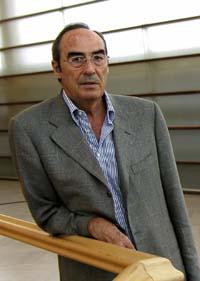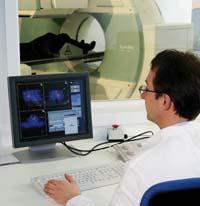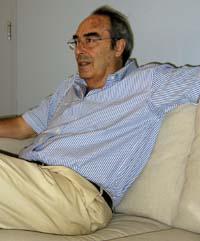Francisco J. Yndurain: "Recognizing more than money

Well I don't know... The truth is that I spend it well working, I'm curious and I really like solving problems. I want to know how things work and how physics is concerned. So I like physics.
In reality it is not a wrong way, but neither is it the most direct. It happens that at that time - I mean the dictatorship - in Spain, specifically in Zaragoza, physics had a very low level, and I wanted to have good studies. So, after a year of studying physics, I went on to mathematics. So I graduated from the University of Zaragoza and then took the chair.
Then I returned to physics, and it must be said that since then the level of physics in Spain has improved a lot. Now it is very good, in some areas we are above the European average. For example, we are very well in what I work, in the theoretical physics of elementary particles.

I have been publishing scientific articles for more than forty years, and yes, the last ones refer to these subatomic particles. But they are forty years and at that time changes a lot. First I started with mathematical physics, as is normal, because it was mathematics, and then I went on to a more phenomenological physics, closer to the experiment.
The distinction between basic science and theoretical science is often made and it is true that it exists. But the experience of many years shows us that the research carried out in basic science always represents an advance in applied science. And that is so, to the extent that many times one does not imagine it.
For example, in the investigation of elementary particles, it was necessary to devise a detector to detect gamma particles. And then this detector has served to detect cancer. In fact, the technique called PET is based on these detectors and is extremely good, very precise and detects the disease in its initial phases.

Look, in the investigation, what happened to Christopher Columbus happens many times. Columbus left the Indies and on the way they found America. In research, the same happens, when you are looking for something you risk finding yourself with what you do not expect. Yes, for this it is necessary to work and be attentive.
The other day I heard Lehendakari Ibarretxe at a lecture. He referred to science and it seems to me that here the topic is taken quite seriously and that researchers receive more help than in many places in Spain.
But not everything is money. For example, I have no problems with money. A theoretical physicist does not need much money to start with, just having a computer, a connection to receive data, a pencil and a paper to make calculations. Others, like experimental physicists, need money to advance.
But more than money, we need to take into account, that administrations take into account what scientists say. In any case, the administration does what society demands and it seems that society itself is not too interested in science, at least not enough to spend money on it. It seems that there are other issues that have priority in this society and we have no choice but to accept this scientist. Before, when Franco was, we blame him, but now the whole society has the responsibility.

Yes, but there we also have difficulties. For example, with the journalist Juanjo of the Church I made a gap in Localia. I was trying to explain scientific issues in a simple and attractive way, and we had a great time doing the program. I think viewers also liked it. But one day it occurred to someone to remove the hole. Instead, they decided to put a series of love, and that would allow them to win more spectators! It is an indicator of the disinterest of people.
With the books I have had more luck. For example, in 1998 they gave the La Golondriz prize of intelligent humor to one of my books. Who is there? (Who is there?) The title is, and is not of scientific dissemination, but of speculation. It talks about the possibility of intelligent beings outside the planet Earth, the possibility of communicating with them, etc. and the edition is exhausted.
That is. And, like NASA, many others use this idea to justify their research or propaganda. For example, when on Earth are living beings in extreme conditions -- extreme cold or extreme heat, concentrations of very high salts, radioactivity, etc.- it is frequent to mention Mars. If on Earth there is life in such harsh conditions, there may also be life on the red planet. But the conditions of Mars are much harder than those of Earth.
Mars is nice to take alien life. It is located near the Earth, is apparently normal compared to other planets, and there are indications that it has ever had water. But it has no atmosphere, it is very cold and today there are no traces of liquid water, at least on the surface. It does not comply, therefore, with the conditions of being a good place to live. However, they must sell in one way or another the research done there and the hope of finding an alien life is the perfect excuse.

The university system we have is unfortunate. The system of designation of the rectors is a demagogy. For example, students and administration staff have no right to vote anywhere else, and it's logical because they don't have to know how the university works.
In the US, for example, a committee elects the rector. The Rector, for example, must respond to this commission, indicating what he has spent the money on. In Spain, however, no one asks the rector for accounts and that is why the university is losing the north. And what is clear is that our young people deserve a better system.
Buletina
Bidali zure helbide elektronikoa eta jaso asteroko buletina zure sarrera-ontzian











